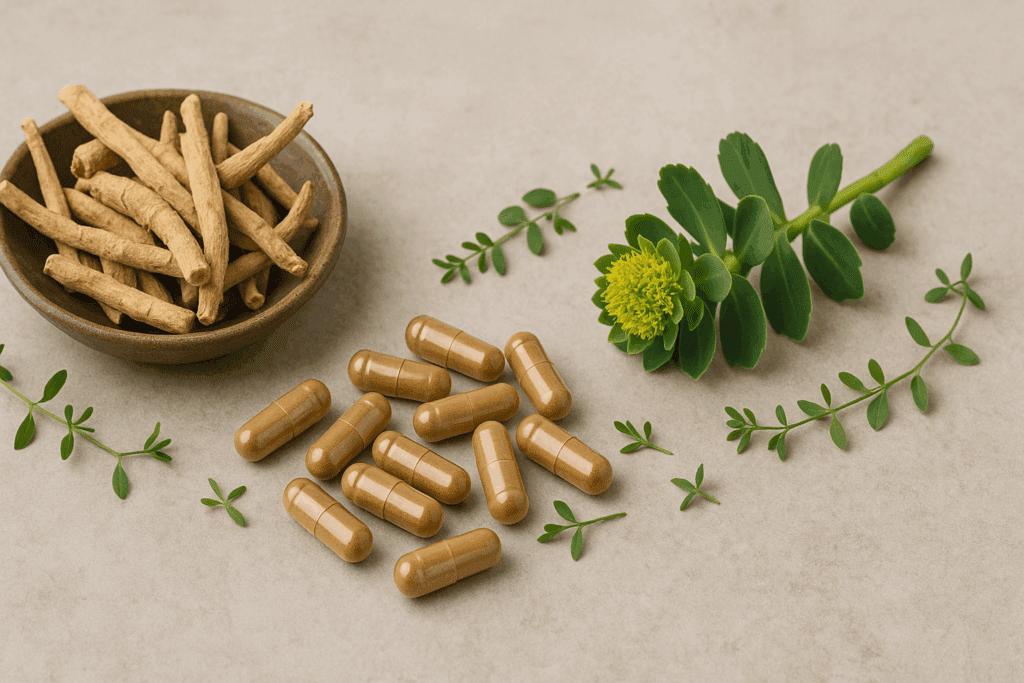Long-Term Use and Safety of Reishi Mushroom for Anxiety Support
As with any natural remedy, understanding the long-term safety profile of reishi mushroom is essential for those considering sustained use. Reishi is generally well-tolerated when consumed in moderate doses and has been used traditionally for extended periods without reports of serious adverse effects. However, it’s important to acknowledge that individual sensitivities can vary, and some people may experience mild digestive upset, dry mouth, or dizziness in the initial stages of use. These side effects typically resolve with dosage adjustment or as the body acclimates to the supplement.
Scientific studies on long-term reishi use are still emerging, but early findings suggest that its adaptogenic effects may accumulate over time, resulting in a gradual strengthening of the body’s stress response mechanisms. Unlike many synthetic anxiolytics, reishi does not appear to cause dependency or withdrawal symptoms, making it a potentially safer alternative for long-term anxiety support. Nonetheless, as with all supplements, periodic evaluation with a healthcare provider is recommended to ensure that it remains appropriate and effective for one’s evolving health needs.
Special populations, such as pregnant women, individuals with autoimmune conditions, or those undergoing immunosuppressive therapy, should approach reishi supplementation with caution. While there is no definitive evidence of harm in these groups, the immunomodulatory effects of reishi may theoretically interfere with immune balance. Therefore, personalized guidance is crucial in these contexts. Overall, when used responsibly and under appropriate supervision, reishi offers a low-risk and potentially high-reward strategy for those seeking enduring relief from anxiety and stress.
You may also like: The Essential Guide to Reishi Mushroom Benefits: How to Use Reishi Mushroom Powder for Stress Relief and Adaptogenic Support

Reishi and Anxiety: Combining with Other Adaptogens for Synergistic Effects
While reishi is a potent adaptogen in its own right, combining it with other stress-supportive botanicals can enhance its therapeutic effects. For instance, pairing reishi with ashwagandha, another well-known adaptogen, may offer complementary benefits for cortisol regulation and mood stabilization. Ashwagandha has been shown in clinical trials to reduce perceived stress, improve sleep quality, and lower cortisol levels, making it a logical partner in an anti-anxiety regimen featuring reishi.
Similarly, rhodiola rosea is another adaptogenic herb that can be paired effectively with reishi. Rhodiola supports mental stamina and resilience to stress-related fatigue, and its stimulating properties can offset any sedative tendencies that some individuals report with reishi. The combination of reishi, rhodiola, and ashwagandha forms a powerful triad that addresses various aspects of the stress response, from physical energy to emotional balance.
However, when combining adaptogens, careful attention must be paid to dosage, timing, and individual constitution. While synergistic benefits are possible, there is also the potential for overstimulation or unexpected interactions. Consulting with a qualified integrative medicine practitioner can help ensure that combinations are personalized to your specific stress profile and health status. With thoughtful formulation, reishi and anxiety can be managed even more effectively through intelligent herbal synergy.
Different Species and Extract Types: What Matters Most
Not all reishi supplements are created equal, and understanding the distinctions between species and extraction methods is vital for achieving desired outcomes. The most commonly used species in supplements is Ganoderma lucidum, which has been the subject of the majority of clinical studies. However, other species such as Ganoderma tsugae and Ganoderma sinense also possess therapeutic properties, and may vary slightly in their chemical profiles and energetic qualities.
Equally important is the method of extraction. Hot water extraction is ideal for isolating reishi’s polysaccharides, which support immune and gut health. Alcohol extraction, on the other hand, concentrates the triterpenoids that are primarily responsible for reishi’s anti-inflammatory and anxiolytic effects. Dual-extraction products offer a balanced profile by combining both methods, providing a more comprehensive spectrum of active compounds.
For anxiety-specific purposes, choosing a dual-extracted supplement derived from the fruiting body of Ganoderma lucidum is typically recommended. This ensures optimal bioavailability and therapeutic range, particularly for targeting nervous system resilience. By understanding the nuances of species and preparation, users can make informed choices that align with their wellness goals and enhance the effectiveness of their reishi supplementation.

Timing and Lifestyle Pairings: Maximizing Reishi’s Anxiety-Relief Potential
The time of day you take reishi can influence its effects, particularly in the context of anxiety management. Many users report that evening dosing promotes deeper sleep and relaxation, while morning use provides a calming yet focused start to the day. The choice often depends on individual response, but for those dealing with nighttime rumination or sleep disturbances, nighttime administration may offer additional benefits.
Reishi works best when integrated into a comprehensive lifestyle plan that includes stress-reducing activities such as meditation, yoga, breathwork, and regular physical exercise. These practices enhance parasympathetic activation—the “rest-and-digest” response—and can synergize with reishi’s calming properties. A whole-foods diet rich in omega-3 fatty acids, magnesium, and B-vitamins further supports neurotransmitter balance and emotional stability, amplifying the benefits of adaptogenic supplementation.
Sleep hygiene also plays a critical role. Reishi’s sedative-adjacent effects can be optimized when paired with a consistent bedtime routine, reduced blue light exposure in the evenings, and the elimination of stimulants like caffeine after midday. These holistic strategies work in tandem to cultivate a nervous system environment that is receptive to the therapeutic potential of reishi. With intentional pairing, the conversation around reishi and anxiety becomes one of empowered self-care rather than passive treatment.
Reishi Mushroom Health Benefits Testimonials: Real Voices, Real Relief
While scientific studies provide the backbone of clinical credibility, anecdotal reports and user testimonials offer valuable qualitative insight into reishi’s impact on real lives. Individuals across diverse demographics consistently report significant improvements in stress tolerance, anxiety reduction, and overall well-being after incorporating reishi into their daily routines. These firsthand accounts often highlight a return to emotional balance, better coping with life’s challenges, and a deeper sense of calm that transcends the temporary effects of pharmaceutical options.
For example, users with high-pressure jobs have described reishi as a “game-changer” for navigating daily stress without feeling sedated or disconnected. Others struggling with social anxiety have noted enhanced confidence and clarity in interpersonal settings. Many testimonials also emphasize improved sleep quality and fewer nighttime awakenings, which can have profound ripple effects on mood, energy, and cognitive function.
These experiences are not merely placebo effects or passing trends; rather, they reflect the culmination of reishi’s bioactive synergy with the body’s innate healing mechanisms. While individual responses may vary, the consistency of positive outcomes across numerous accounts underscores the relevance of reishi and anxiety in modern natural health conversations. As more people seek alternatives to conventional medications, the lived experiences of reishi users offer compelling support for its place in holistic mental wellness protocols.

Reishi and Anxiety: An Adaptogenic Blueprint for Personalized Wellness
Ultimately, the integration of reishi into an anxiety support protocol represents more than just symptom management—it embodies a paradigm shift toward sustainable wellness. As an adaptogen, reishi does not override the body’s natural rhythms but rather supports them, allowing for a more responsive and resilient stress response. This quality makes it uniquely suited for individualized wellness strategies that honor the complexity of mental health.
Reishi’s flexibility is one of its greatest strengths. Whether used as a standalone supplement or in combination with other botanicals and lifestyle practices, it offers a customizable approach to stress relief that aligns with the principles of functional and integrative medicine. Rather than forcing a one-size-fits-all model, reishi encourages self-awareness, ongoing evaluation, and personal agency in the pursuit of emotional equilibrium.
In an era where mental health challenges are both widespread and deeply personal, the relationship between reishi and anxiety offers a beacon of hope. It reminds us that healing can be both gentle and powerful, rooted in nature yet informed by science. By embracing this holistic blueprint, individuals can navigate the pressures of modern life with greater clarity, courage, and calm.
Frequently Asked Questions: Exploring the Relationship Between Reishi and Anxiety
Can reishi improve emotional resilience in high-performance environments?
Yes, reishi may be particularly beneficial for individuals operating in high-pressure or performance-driven environments such as executives, entrepreneurs, and elite athletes. In these settings, stress is often chronic and performance anxiety can lead to emotional dysregulation. Reishi’s adaptogenic properties help buffer the body’s reaction to prolonged stress exposure, enabling more stable emotional responses under pressure. What’s especially compelling is that reishi doesn’t blunt motivation or energy like some pharmaceutical options might—it supports sustained cognitive endurance without the crash. This makes it an ideal candidate for those looking to perform consistently without succumbing to the emotional wear-and-tear of overexertion.
What is the link between reishi and anxiety for individuals with social stressors?
For individuals experiencing social anxiety or interpersonal stress, reishi may provide a unique form of support by influencing oxytocin pathways and modulating amygdala reactivity—two areas associated with social behavior and fear response. Though research is still in early stages, some studies suggest that reishi’s ability to reduce neuroinflammation could positively affect the brain regions involved in social threat detection. This may explain why many people report feeling more comfortable in social settings after several weeks of reishi supplementation. Unlike pharmaceutical anxiolytics, which can sometimes cause emotional blunting, reishi tends to preserve authenticity in interactions while reducing excessive internal stress. The relationship between reishi and anxiety in social contexts is therefore grounded in both neurological and behavioral mechanisms.
How does reishi interact with long-term emotional memory and trauma recovery?
Emerging neuroscience suggests that reishi might influence long-term emotional memory through its effect on the hippocampus and neuroplasticity. Chronic anxiety, especially stemming from past trauma, often involves hyperactivation of memory loops tied to fear-based responses. Reishi’s compounds, particularly triterpenoids, may help dampen this overactivity while supporting the regeneration of neurons involved in emotional regulation. This doesn’t imply reishi is a cure for trauma, but it could complement therapies like EMDR or cognitive behavioral therapy by creating a neurochemical environment more conducive to healing. By modulating both memory retrieval and emotional valence, reishi may offer nuanced support during recovery from long-standing emotional wounds.
Can reishi support emotional health during hormonal changes or menopause?
Absolutely. Hormonal transitions such as menopause or perimenopause are often accompanied by increased anxiety, mood swings, and sleep disturbances. Reishi’s adaptogenic role is particularly well-suited to these shifts, as it helps modulate cortisol and support adrenal resilience. Additionally, its potential influence on estrogenic pathways, though subtle, may help stabilize mood fluctuations during these transitional periods. Many women report that combining reishi with other adaptogens like maca or shatavari creates a balanced protocol for managing hormonal anxiety without the side effects of hormone replacement therapy. Reishi and anxiety management during menopause is an area ripe for further exploration, especially through integrative medicine.
Why are reishi mushroom health benefits testimonials often focused on emotional well-being?
Reishi mushroom health benefits testimonials frequently emphasize emotional and mental improvements because its effects are subtle, cumulative, and systemic rather than dramatic and immediate. Users often describe a greater sense of centeredness, reduced mental chatter, and a more measured response to daily stressors. These outcomes are difficult to quantify in a laboratory setting but are deeply felt in day-to-day life. What makes these testimonials powerful is the consistency of experiences across age groups, occupations, and stress profiles. The repeated mentions of calmness, clarity, and emotional resilience in reishi mushroom health benefits testimonials reveal a widespread and genuinely perceived enhancement in mental well-being.
Is there a connection between reishi and anxiety for people with seasonal affective tendencies?
Yes, reishi may offer mood-stabilizing support during seasonal affective periods, particularly in the fall and winter months when sunlight exposure decreases and serotonin levels dip. Its ability to influence neurotransmitter balance—including dopamine and serotonin precursors—makes it potentially useful for addressing the cyclical anxiety and depressive symptoms associated with seasonal affective disorder (SAD). Reishi also supports immune function, which often declines in colder months, creating a more resilient physical and emotional state. While not a replacement for light therapy or vitamin D supplementation, reishi can serve as a valuable adjunct in comprehensive SAD management protocols. This is one more example of how the relationship between reishi and anxiety extends into multiple seasonal and environmental domains.
How can reishi be used creatively in culinary routines to support mental health?
While traditionally consumed in capsule or tincture form, reishi can be incorporated into culinary routines to create comforting rituals that support both mind and body. Reishi-infused teas, broths, or even mushroom-based hot chocolates are popular ways to ease reishi into daily life. These beverages can be paired with adaptogenic spices like cinnamon, cardamom, or turmeric for enhanced synergistic effects. Culinary rituals built around reishi not only deliver therapeutic compounds but also cultivate mindfulness, which is itself a known mitigator of anxiety. In this sense, reishi becomes more than a supplement—it transforms into an act of self-nourishment that integrates seamlessly into anxiety-reducing lifestyle habits.
Are there emerging clinical studies on reishi’s role in digital-age anxiety?
As digital overstimulation becomes a growing mental health concern, researchers are beginning to examine how adaptogens like reishi can support those affected by screen-induced stress and attention dysregulation. Early investigations suggest that reishi’s antioxidant and neuroprotective properties may help counteract the overstimulation and dopamine hijacking caused by prolonged exposure to digital media. Individuals suffering from screen-related anxiety, often characterized by racing thoughts, hypervigilance, or poor sleep, may find relief by incorporating reishi alongside practices such as digital detoxing and blue-light reduction. This emerging context for reishi and anxiety speaks to its relevance in addressing modern mental health challenges that traditional pharmacology may overlook.
What are the spiritual or energetic perspectives on reishi and anxiety?
From a traditional Chinese medicine (TCM) and spiritual wellness standpoint, reishi is known as a shen tonic—an herb that nourishes the spirit and harmonizes the heart-mind connection. Shen is believed to be the spiritual essence that governs mental clarity, emotional balance, and inner peace. Anxiety, from this viewpoint, is seen as a disturbance of shen, often caused by excessive worry, fear, or overstimulation. Reishi is used to anchor the spirit, reduce internal agitation, and promote serenity. This perspective, while not widely discussed in biomedical literature, is increasingly appreciated in holistic circles for its depth and wisdom. For those seeking a more soul-centered path to healing, reishi’s energetic properties offer a dimension of care that purely biochemical approaches may not fully capture.
How might future innovations shape the use of reishi for anxiety support?
Advancements in biotechnology and personalized medicine are likely to refine how we use reishi to address anxiety. Genomic profiling may soon identify which individuals respond best to certain adaptogens, allowing for more customized reishi protocols. Additionally, nanotechnology and advanced extraction techniques may enhance the bioavailability of reishi’s active compounds, leading to more potent formulations with faster onset times. Functional beverages, mood-regulating nutraceuticals, and AI-informed adaptogen stacks may also incorporate reishi in increasingly innovative ways. As reishi mushroom health benefits testimonials continue to inform clinical curiosity, future studies will likely explore microdosing strategies, delivery systems, and combinatory formulas to optimize its effects. The ongoing evolution of reishi and anxiety support will undoubtedly blend ancient knowledge with cutting-edge science for even greater efficacy.
Conclusion: Reishi and Anxiety Relief in the Age of Natural Medicine
In the broader landscape of stress-relief and anxiety support, reishi mushroom stands out as a remarkable agent of calm, resilience, and renewal. From its ancient roots in Eastern medicine to its validated impact in contemporary research, reishi bridges worlds—past and present, traditional and scientific, physical and emotional. Its adaptogenic qualities allow it to tune into the body’s needs, offering support that is both gentle and effective.
The significance of reishi and anxiety cannot be overstated, especially as more people seek natural alternatives to pharmaceutical interventions. By modulating stress hormones, protecting neural integrity, supporting gut health, and enhancing emotional regulation, reishi offers a multidimensional approach to anxiety that few substances can match. Whether through clinical studies or heartfelt testimonials, its benefits are becoming increasingly recognized across wellness communities worldwide.
As we look to the future of mental health care, the integration of functional mushrooms like reishi represents a meaningful evolution. It invites a return to natural wisdom, informed by modern insights, and encourages proactive participation in one’s healing journey. For those searching for a natural path toward inner peace, reishi may well be the companion they have been seeking—a steady, grounding force in an often chaotic world.
Further Reading:
Reishi Mushrooms for Stress & Anxiety
The Ancient Wisdom of Reishi Mushrooms: A Modern Remedy for Stress and Anxiety
